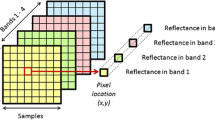Abstract
Principal component analysis (PCA) is one of the widely used techniques for dimensionality reduction in multivariate statistical analysis. This article presents an efficient architecture design and implementation of the PCA algorithm on a field-programmable gate array (FPGA). The designed reconfigurable architecture is modeled in both floating-point and fixed-point representations using our custom-developed library of numerical operations. The PCA architecture supports input dataset matrices with parameterizable dimensions. The synthesizable model of the PCA architecture is modeled in Verilog hardware description language, and its cycle-accurate and bit-true simulation results are verified against its software simulation models. The characteristics and implementation results of the PCA architecture on a Xilinx Virtex-7 FPGA and in a standard 45-nm CMOS technology are presented. The execution times of the implemented PCA system on the FPGA for different data sizes are compared with those of the graphics processing unit and general-purpose processor implementations. To the best of our knowledge, this work is the first high-throughput design and implementation of the reconfigurable PCA architecture, including both the learning and mapping phases, on a single FPGA.











Similar content being viewed by others
References
H. Abdi, Multivariate analysis, in Encyclopedia for Research Methods for the Social Sciences, ed. by M. Lewis-Beck, A. Bryman, T. Futing (Sage, Thousand Oaks, 2003)
H. Abdi, L.J. Williams, Principal component analysis. Wiley Interdiscip. Rev. Comput. Stat. 2(4), 433–459 (2010)
A.A.S. Ali, A. Amira, F. Bensaali, M. Benammar, Hardware PCA for gas identification systems using high level synthesis on the Zynq SoC, in IEEE International Conference on Electronics, Circuits, and Systems, (2013), pp. 707–710
T.J. Bauer, The design of an efficient hardware subroutine protocol for FPGAs, in Ph.D. Dissertation, (Massachusetts Institute of Technology, Cambridge, 1994)
M. Borgognone, J. Bussi, G. Hough, Principal component analysis in sensory analysis: covariance or correlation matrix? Food Qual. Prefer. 12(5), 323–326 (2001)
T.C. Chen, W. Liu, L.G. Chen, VLSI architecture of leading eigenvector generation for on-chip principal component analysis spike sorting system, in International Conference of the IEEE Engineering in Medicine and Biology Society, (2008), pp. 3192–3195
A. Das, S. Misra, S. Joshi, J. Zambreno, G. Memik, A. Choudhary, An efficient FPGA implementation of principle component analysis based network intrusion detection system, in Proceedings of the Conference on Design, Automation and Test in Europe, (2008), pp. 1160–1165
G.H. Golub, H.A. Van der Vorst, Eigenvalue computation in the 20th century. J. Comput. Appl. Math. 123(1), 35–65 (2000)
G.H. Golub, C.F. Van Loan, Matrix Computations (Johns Hopkins University Press, Baltimore, 2012)
G.H. Golub, F. Uhlig, The QR algorithm: 50 years later its genesis by John Francis and Vera Kublanovskaya and subsequent developments. IMA J. Numer. Anal. 29, 467–485 (2009)
T. Karnthak P. Kumhom, A hardware implementation of PCA based-on the networks-on-chip paradigm, in International Symposium on Communications and Information Technologies, (2012), pp. 834–839
U.A. Korat, A reconfigurable hardware implementation for the principal component analysis, in M.S. Thesis, (Department of Electrical and Computing Engineering, San Diego State University, San Diego, CA, 2016)
U.A. Korat, P. Yadav, H. Shah, An efficient hardware implementation of vector-based odd-even merge sorting, in IEEE Conference Ubiquitous Computing, Electronics and Mobile Communication, (2017), pp. 654–657
E. Kreyszig, Adv. Eng. Math. (Wiley, New Yourk, 2011)
R. Mueller, J. Teubner, G. Alonso, Sorting networks on FPGAs. Int. J. Very Large Data Bases 21(1), 1–23 (2012)
A. Ray, A survey of CORDIC algorithms for FPGA based computers, in International Symposium on Field Programmable Gate Arrays, (1998), pp. 191–200
M. Ren, Cordic-based Givens QR decomposition for MIMO detectors, in Master’s Thesis, (Georgia Institute of Technology, Atlanta, 2013)
M.U. Torun, O. Yilmaz, A.N. Akansu, FPGA, GPU, and CPU implementations of Jacobi algorithm for eigenanalysis. J. Parallel Distrib. Comput. 96, 172–180 (2016)
L. Vuataz, Some points of methodology in multidimensional data analysis as applied to sensory evaluation, in Nestle Research News, (1976), pp. 57–71
Acknowledgements
We would like to thank Mr. Ian Schofield for providing the GPU execution time for the PCA implemented on the GPU.
Author information
Authors and Affiliations
Corresponding author
Additional information
This work was supported (in part) by the Center for Sensorimotor Neural Engineering (CSNE), a National Science Foundation Engineering Research Center (EEC-1028725).
Rights and permissions
About this article
Cite this article
Korat, U.A., Alimohammad, A. A Reconfigurable Hardware Architecture for Principal Component Analysis. Circuits Syst Signal Process 38, 2097–2113 (2019). https://doi.org/10.1007/s00034-018-0953-y
Received:
Revised:
Accepted:
Published:
Issue Date:
DOI: https://doi.org/10.1007/s00034-018-0953-y




